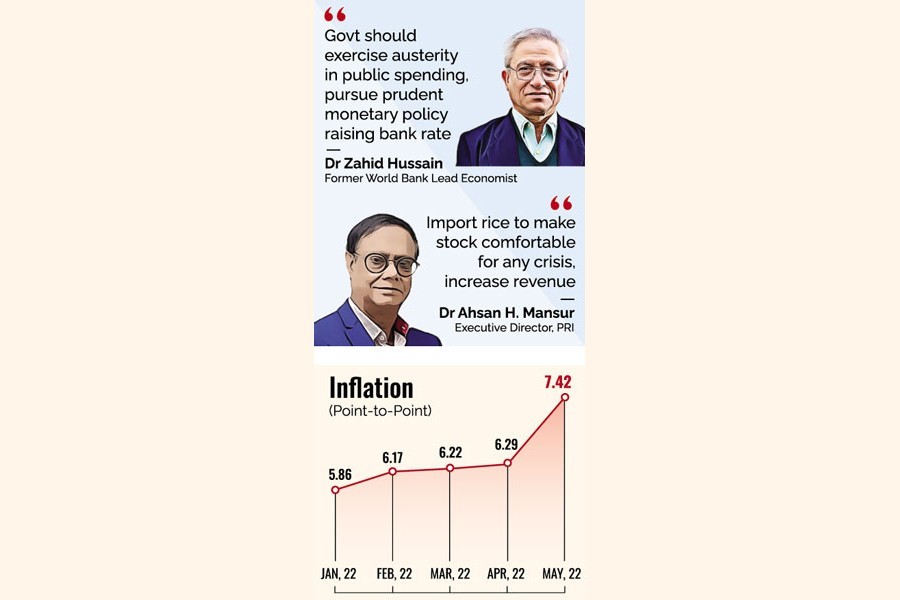Price rises pushed up inflation to a record-high 7.42 per cent in Bangladesh by official count, overshooting government estimation amid market volatility globally and locally.
Economists suggest contingency planning for possible crisis management as the rate of point-to-point inflation, as of May, hit the highest level in eight years as revealed in the official statistics released Sunday.
Eight years ago in May 2014, the month-on-month inflation was recorded at a new peak of 7.48 per cent, the Bangladesh Bureau of Statistics (BBS) data showed.
A record-high consumer price index (CPI), recorded at 8.30 per cent last month, built up massive inflationary pressure on food items, according to the BBS data.
However, the rate of inflation on account of food declined a bit to 6.08 per cent in the past month, the national statistical body showed.
Meanwhile, the rate of the point-to-point inflation in the previous month of April was 6.29 per cent.
Besides, the CPI pressure in May last year (2021) was comparatively cool as it was recorded at 5.26 per cent.
Economists say it will be very challenging for the government to tame the inflationary pressure as it is expected to be higher in the days ahead for factors like pandemic fallout, war disruptions to global supply chains and domestic adversities.
People, especially in the middle-and lower-income groups, have already been struggling with higher prices of essentials over the months as rice, flour, pulses, sugar, cooking oils, and vegetables are maintaining higher rates at retails.
According to BBS observation, rural people are the worst victims of the CPI pressure as the point-to-point inflation rate in May was recorded at 7.94 per cent in the countryside.
On the other hand, the inflation rate in urban areas was comparatively lower at 6.49 per cent in the last month.
In the villages, the food inflation jumped by a record 2.20 percentage points to 8.84 per cent in May.
However, the non-food inflation was maintaining a bit lower trend in rural Bangladesh as it declined by 0.24 percentage points to 6.26 per cent.
In the urban areas, the month-on-month food inflation increased by 1.77 percentage points to 7.08 per cent in May.
The non-food inflation in the cities decreased to 5.85 per cent compared to 6.25 per cent in the previous month, April.
Former World Bank Lead Economist Dr Zahid Hussain thinks the inflation could rise further as the peak has yet to be seen.
"The global and domestic supply chains are being disrupted, and floods engulfed a part of the country. So, the inflation may be rising in the coming months, too," he says.
"Meanwhile, the government has given an expansionary national budget with huge fund deficit. This will add another round of inflationary pressure in the coming days," Dr Hussain told the FE.
The former WB economist suggests that the government go for austerity in public spending and take a prudent monetary policy adjusting the bank rate upward.
Policy Research Institute (PRI) Executive Director Dr Ahsan H Mansur predicts that inflation in next 5-6 months will be on an upturn. "The government should go for rice import for creating its stock comfortable for any possible crisis in the coming days," he told the FE.
"Besides, the government should show its cautious approach to public spending, especially in the revenue spending, and should try to boost its revenue income at the same time," the economist, who had once served at the IMF, suggests.
Both the economists expressed their highest degree of doubt about government's commitment to keeping the inflation within 5.6-percent limit.


